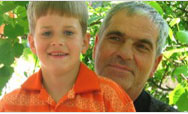You are here » Home » Telling Our Story
Case Study
Reducing stress by giving woman jobs and children a place to play
Giving Children a Safe Place to Play

| |
Photo: USAID/Suzanne Ross
|
|
Girls at the Maira Camp have a safe place to play together in a tent that protects them from snow and rain.
Safe play areas provide children with psychological and social support while parents receive training and work.
|
Challenge
Few of the 2,000 Pashtu-speaking children who came to Mehra Tent Camp after being displaced by the October 2005 earthquake in Pakistan were accustomed to meeting people beyond their immediate social circle. The 16,000 camp residents come from many different villages high above the Allai Valley. Living in unfamiliar, densely populated tent areas, where plastic sheeting separates make-shift villages, children in the camp perceive the stress of a culture changed by the disaster. After the earthquake, many of these children were separated from their family members, as surviving family either looked for jobs in distant places or stayed home to protect whatever assets remained. Children were also separated from their homes and everyday activities. The separation from familiar people, places, and things heightened the children’s insecurities.
Initiative
To help children cope with the earthquake’s aftermath, USAID created 90 safe-play areas in affected areas. Three of these areas are in Mehra Tent Camp. A safe-play area is carefully planned in a designated location with limited exposure to hazards. Tented, safe areas provide children with a place to play games, listen to stories, make friends, and learn life skills. Children also have access to outdoor play equipment and cricket fields. Children living in flux after a disaster need not only a safe place to play but also more attention and supervision that is sensitive to their needs. A USAID-funded cash-for-work project hired Pashtu-speaking women living in the camp to care for the children. As part of the program, childcare experts trained the Pashtu women in caring for children under these challenging and constrained circumstances.
Results
Children benefit from the safe play concept, and their parents gain a new, first-hand appreciation of the importance of safe play as they begin to plan their return to their villages and rebuild their communities.
Print-friendly version of this page (449kb - PDF)
Click here for high-res photo
Back to Top ^ | 

